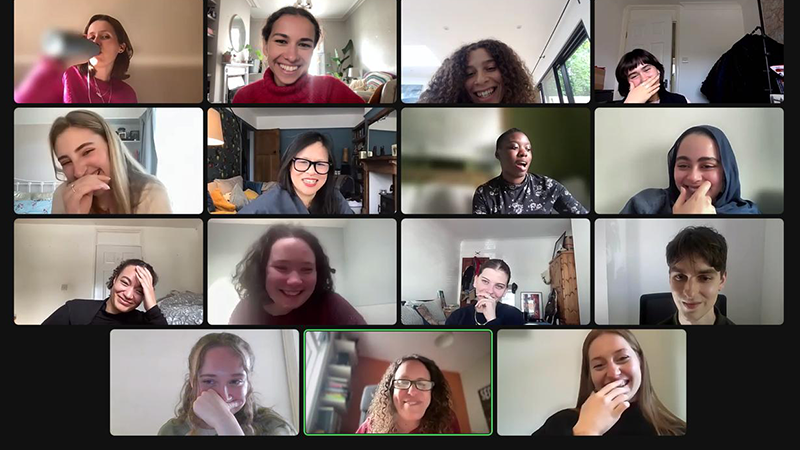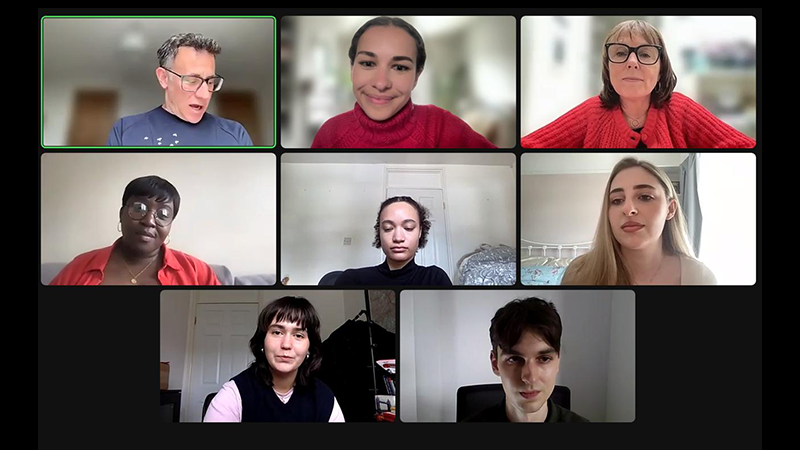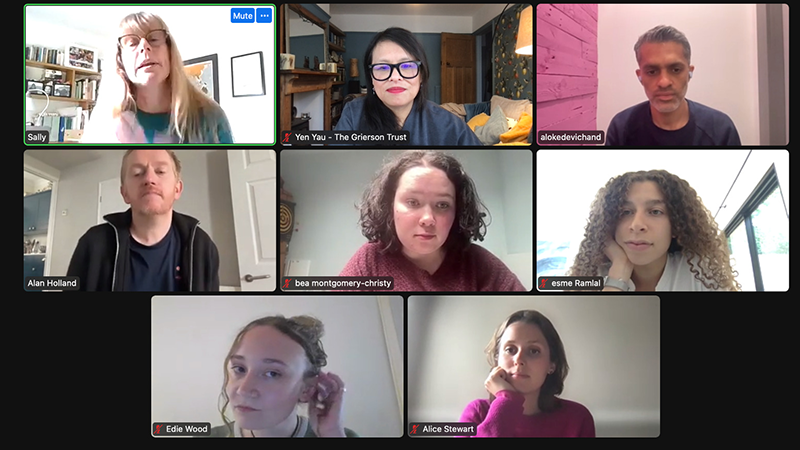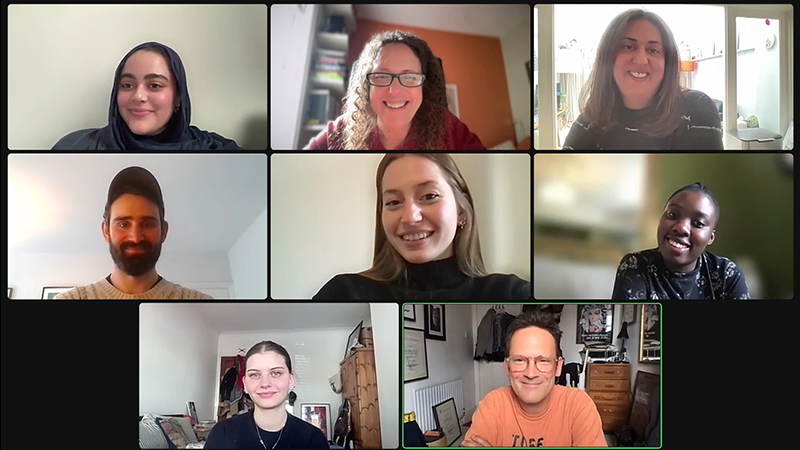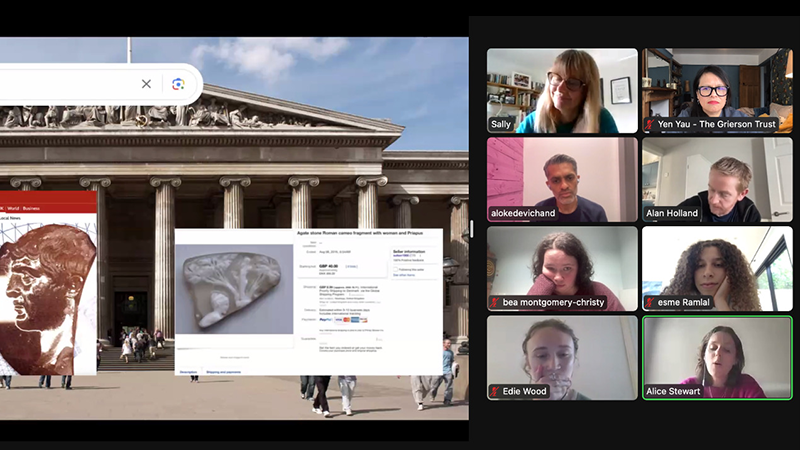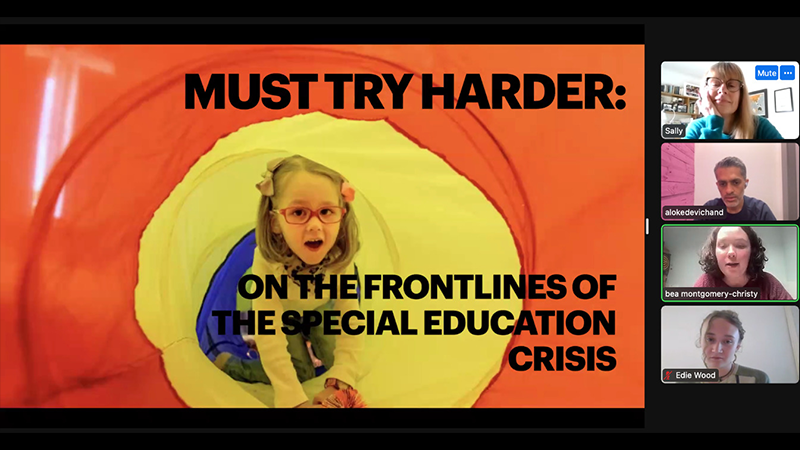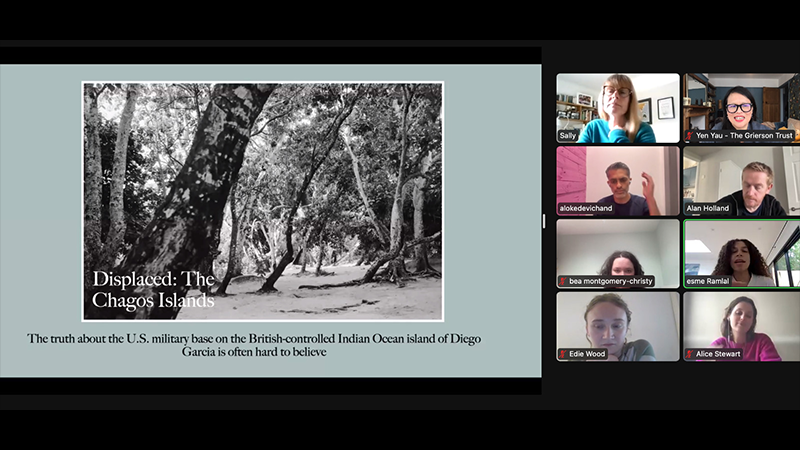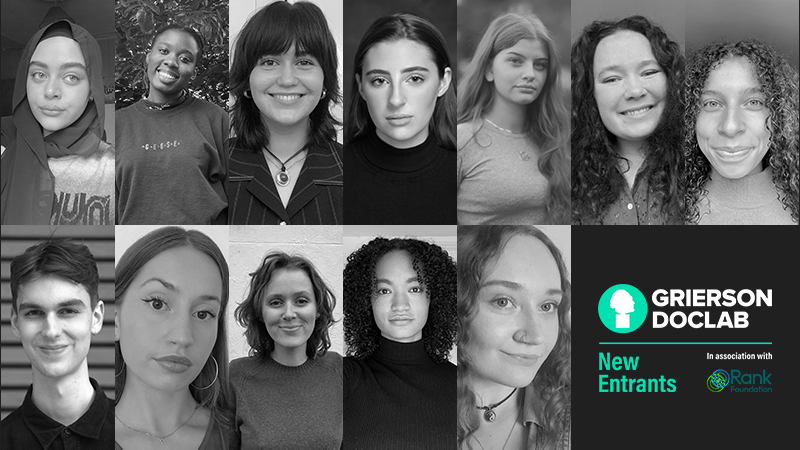July 09, 2024
What the New Entrant trainees covered in the online programme
Read more about what sessions, speakers and exercises the Grierson DocLab: New Entrants group completed during the online portion of their training.
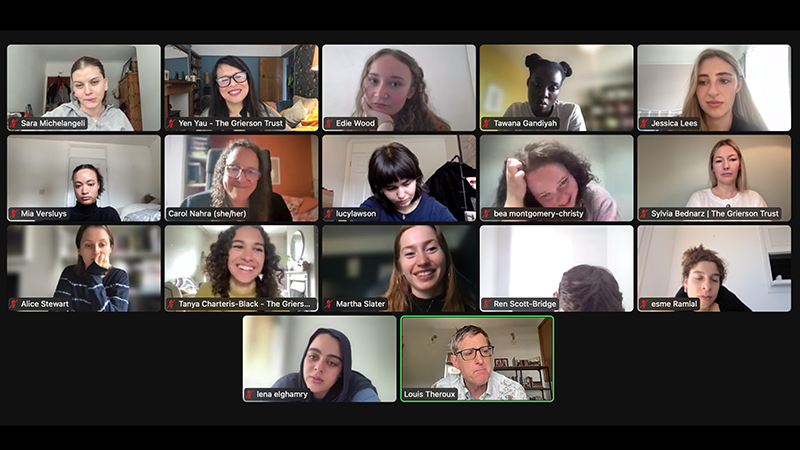
Louis Theroux joins the New Entrant trainees on the first day of the online training week.
Monday 3 June
Jessica
The morning of our online training week started with a discussion of my chosen clip which was from VICE’s Hate Thy Neighbour series specifically the episode America’s Far White.
We had an insightful discussion about the ethics of producing such content which showed themes of racism and antisemitism. We then talked about the style of interviewing from presenter Jamali Maddix who uses comedy to make fun of the absurdities that are happening during filming.
This then leads us to a discussion of Louis Theroux and his interviewing style during a clip from The Most Hated Family in America. We all agree that Louis’ tone and delivery had a big affect on the contributors in his documentary and how this would reflect their views and personalities to the audience.
As we continued our discussion our guest speaker arrived who turned out to be none other than… Louis Theroux!
This was an amazing surprise as Louis has been inspirational to us all. I was lucky enough to ask him a question related to my pitch involving safety and whether there had been a time when he had felt like it was too dangerous to carry on filming. Louis told us some interesting stories and gave us some stellar advice on the subject.
After we finished our talk with Louis, we did an OFCOM exercise. We were given the task before the week started to review an OFCOM decision and understand the circumstances of why that conclusion had been reached. Edie and had an interesting discussion on the complex area of privacy and broadcasting.
I had the most wonderful Monday morning, and I can’t thank the Grierson team enough for this opportunity.
Martha
After an exciting morning of meeting the one and only Louis Theroux, discussing OFCOM regulations and getting some all-important feedback from Carol for our upcoming pitches it was time for lunch! I think it’s safe to say we all spent that hour calling our family and friends to tell them about our chat with Louis. I quickly ate my lunch during the break and rejoined the zoom call for our final session of the day with David Thomas, who gave us some invaluable insight into how to manage our finances as a freelancer. I was happy to know it is easy to pay your taxes and that we shouldn’t be worried about committing tax fraud! We all definitely took a lot from that session, and I already know that the resources David has provided us will be so useful once we start getting our contracts. Thank you, Grierson for the best first day!
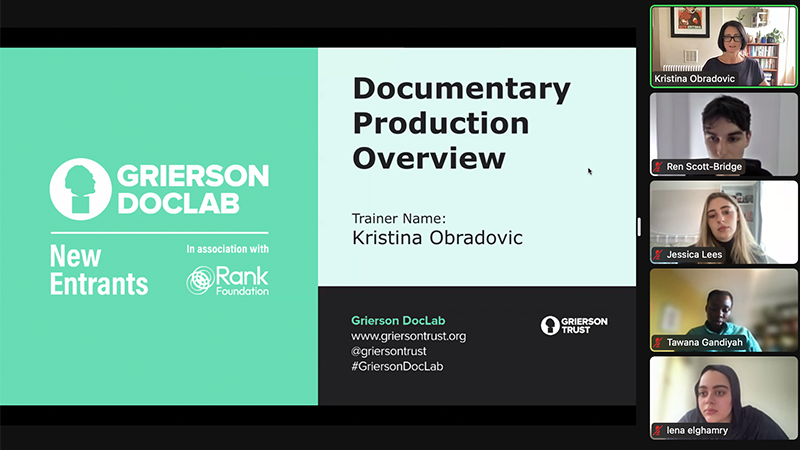
Tuesday 4 June
Lucy
We kicked off the second day of our online training week with an insightful talk from Senior Production Exec and Grierson Trustee, Kristina Obradovic. The presentation taught us all about a production’s lifecycle from commissioning through to transmission (or TX – a bit of industry lingo I picked up!)
Kristina used the example of a Windfall Films production Dambusters Building the Bouncing Bomb in order to show us the different logistical elements that are considered during production. A particularly interesting part of this discussion focused around how sustainability protocols have evolved. There are certain commitments which exist in the industry nowadays, such as Albert certifications, which were not required when the show was produced in 2011. We reflected on how the experiments in Dambuster might have been approached differently if they took place in 2024, and it was great to see how much change can be made in the industry in such a short span of time.
Kristina also used this case study to illustrate the different ways one can creatively re-tell landmark history moments. This was a discussion which continued in our session with tutor Carol Nahra, wherein we explored different creative approaches through watching clips that my fellow trainees had selected from their favourite docs!
Ren
The afternoon started with further research and development on our pitches - which need to be finalised and ready to present by Friday! Carol provided us with constructive feedback, pointing out areas for improvement.
After lunch, Grierson DocLab Alum, Rashida Josiah joined our call. She shared her experiences in the industry, focusing on casting. We discussed cutting down casting tapes and summarising candidates to meet specific criteria. Rashida talked about her work on First Dates and the process of managing a great number of contributor applications. She also discussed the casting process for Love Island, where they look for candidates from diverse backgrounds and professional occupations.
Rashida has now moved into location management. She shared her experiences of scouting locations in Morocco and Norway for Race Across the World, highlighting the need for careful planning and logistics.
Later, Tanya Motie joined us to talk about the TV Access Project and the need for industry-wide change. We discussed the Jack Thorne MacTaggart Lecture at Edinburgh and the necessity to achieve full inclusion by 2030 for disabled talent. Tanya introduced the 5 As - Anticipate, Ask, Assess, Adjust, Advocate - as guidelines for supporting and celebrating Deaf, Disabled and/or Neurodivergent talent, both behind and in front of the camera.
The day ended with a discussion on building long-term relationships in the industry. We spoke about the importance of approaching someone to discuss why you enjoyed their work, which can help foster a positive connection.
Today’s training highlighted the importance of adaptability, continuous learning, and a commitment to inclusivity in factual TV.
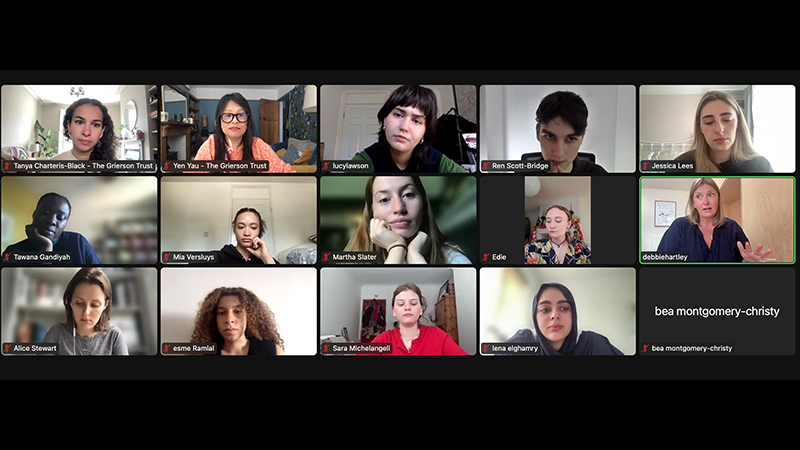
Wednesday 6 June
Alice
To kick off day three of our online training week, we were joined by Debbie Hartley. Debbie is a talent executive who used her session to demystify the first steps into the industry. Her session was incredibly helpful, she talked about her own career journey from editorial to now working in talent. She also shared valuable insights into how talent executives work and her top tips for reaching out to talent executives as we start our careers.
We then jumped right into a session with Carol Nahra, our training facilitator for the entire programme. Carol focused this session on contemporary documentary trends. As part of the discussion, we focused on the pros and cons of AI. We looked at some innovative examples of AI in documentaries, like blurring faces for anonymity in I'm an Alcoholic: Inside Recovery and Welcome to Chechnya.
We finished the morning working on our own pitches in small groups. Getting to hear everyone's pitches and seeing how they developed over the week was an unexpected highlight of the week. It was exciting seeing all the little (or sometimes big) changes everyone made to their pitches as we got closer and closer to our pitching day.
Mia
After a productive and informative morning, including a talk from Debbie Hartley and an insightful session about contemporary documentary trends, we came back after lunch to an interactive task organised by Carol.
Divided into groups, we were assigned to review the Radio Times TV schedule from the previous night. We were tasked to choose three factual programmes and write brief summaries relating to the topic and approach of the shows, using industry terminology from our required readings.
I was struck by the number of factual TV shows available to British audiences throughout the evening and came across many that I had never encountered before. It was a vital learning experience that prompted me to ask new questions of TV programmes, such as: What is the genre? What is the audiences motivation for watching? Where is it set? What is the narrative guide?
Following this, we had the privilege of being joined by Janine Thomas, a commissioning editor at Channel 4. As someone who has long been fascinated by Channel 4’s output, I was particularly excited to hear from Janine and learn more about the commissioning process.
Janine began by discussing her route into the industry, which was, as she described, far from ‘cookie cutter’, having had stints in a variety of industries before transitioning into TV. As someone with an academic background in the humanities and no prior industry experience, I found her story comforting, and it inspired me with confidence in my own journey.
Janine’s primary focus related to her current role as the commissioning editor for Channel 4’s UNTOLD label. She provided a detailed and comprehensive explanation of the commissioning process from being presented with the initial idea through to broadcast. I was fascinated to learn about the extent to which the commissioner is involved at every stage, including providing feedback on rough cuts, scripts, and the fine cut to ensure programmes fit within the UNTOLD format.
Finally, we ended the day with a short discussion and recap with Tanya and Yen, where we had the opportunity to discuss our thoughts on the day and share our key takeaways from Janine’s talk. Like with every experience I have had with the Grierson Trust so far, I came away from the day feeling incredibly grateful for the learning opportunities and inspired, particularly by the experiences of the industry professionals.
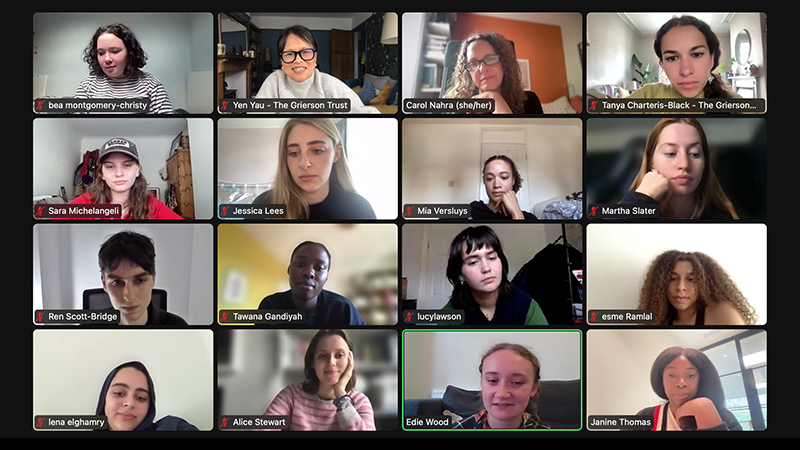
Thursday 7 June
Sara
We started Thursday off very similarly to the rest of our online week; drinking coffee together in our communal (virtual) space, whilst Yen and Tanya prepped us for the day ahead. By day four, we were all beginning to feel the intensity of the week, but as always, were excited to see what we would learn from the speakers and training sessions yet to come.
Thursday morning was largely concerned with prepping for our pitches on Friday afternoon, with each of us presenting our developed pitch concepts to the other members of the cohort, seeking advice and constructive criticism on what we had down thus far. I was happy to see people’s pitch concepts which I hadn’t seen previously, and was so excited by the variety of the genres and themes presented, as well as the amount of research and time which had gone into them, especially as they often highlighted people’s natural areas of interest and knowledge.
With our trainer Carol we delved a little further into the contemporary sub genre, learning about desktop docs and the importance of multi-platform transmission when catering to younger audiences, as well as the increase of more visually stylised docs making their way to mainstream broadcasts. It was interesting to learn more about how things have changed within the documentary space, and how the industry keeps up with viewing trends as well as changes in technology in both production and audience settings.
We rounded off the morning by being tasked with conducting further research into a production company supporting the DocLab scheme, presenting our findings to the rest of the group, where I had the opportunity to learn more about Nutopia. Although I had done some research into the company when getting onto DocLab, it was interesting to find out more about the company values and ethos (blending talent-led factual with high-scale cinematographic visuals to create impactful popular science documentary), as well as discovering more about the companies they work with (such as Darren Aronofsky’s production company, Protazoa Pictures). This session was unbelievably inspiring for me, as it still doesn’t feel quite real that we have been given the opportunity to work with so many accomplished companies who work with some of the biggest global names in film direction and production. Once again, the biggest thank you to everyone at the Trust for putting on such a wonderful week for us. I can’t wait to see what Sheffield DocFest brings!
Edie
By Thursday of the online training week, it suddenly became very real that were going to be presenting our pitches to industry professionals in just a day’s time. The group therefore decided it would be beneficial to dedicate a little extra time to pitch prep. We rehearsed our presentations in small breakout rooms, receiving useful feedback on these from our fellow DocLabbers. It was incredible to see just how varied everyone’s pitches were in the topics and issues they highlighted, and in their creative approaches to form. I’m no commissioner, but each pitch I heard sounded like a truly viable project!
Later on, we were tasked with researching a production company and feeding back to the group. I was randomly assigned Wall to Wall, which was a perfect match given that their genealogy series like Who Do You Think You Are? and Long Lost Family had provided inspiration for the format I had developed for the pitching activity.
Our resident DocFest expert, Sylvia, later joined the call to speak to us a little more about what to expect in Sheffield. Her intel was invaluable and ranged from tips on festival etiquette, to advice on which panels were worth a watch, to even restaurant recommendations. I made sure to bring my notes from this session along with me to Sheffield!
Towards the end of the day, we were lucky enough to be joined by Jane Zurkowski, who spoke to us about Production Management. I, along with many others in the group, had little prior knowledge of production management, so I was eager to learn more about this role. Jane explained a production manager’s key responsibilities, and listed off the logistical factors that must be considered when planning a production. I left the session with not just a newfound understanding of production management, but with a deep respect for the next-level organisational skills of those in the profession.
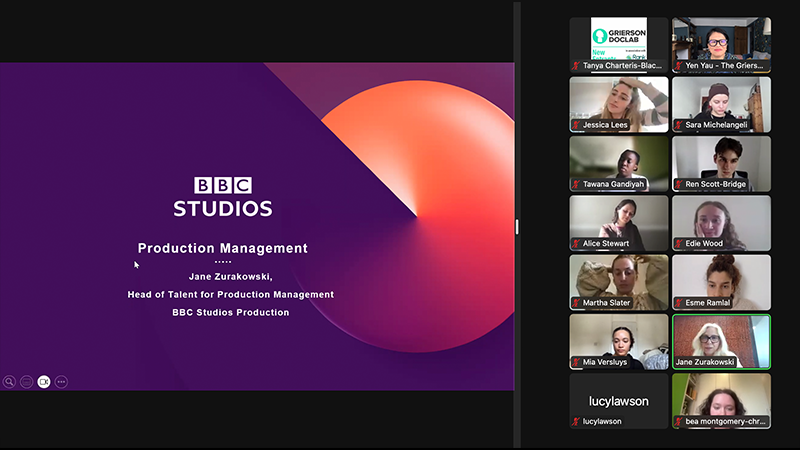
Friday 8 June
Lena
On the second to last day, we all jumped on Zoom looking quite different from our usual exhausted selves. Everyone was dressed to impress and ready to take on the day—probably because we were about to pitch to industry professionals (Argh!).
First though, we had a talk from Rowan Bray and Lucy Allen from Clear Cut Pictures all about post-production workflows. This session was a great distraction from my nerves about the afternoon and proved to be incredibly insightful.
After our session and debrief, the countdown began. We all started putting the final touches on our pitches. I did some last-minute research to ensure I was an expert on my topic. Suddenly, lunch was over, and I found myself on a Zoom call with three incredible industry professionals: Fatima Salaria, Ben Anthony, and Mike Philo. I was in the presence of a BAFTA winner, a truly inspiring woman, and the Head of Development at an amazing production company.
We all delivered our pitches, and to be honest, we absolutely nailed it. Afterward, we received our feedback. While the praise from industry experts was a slight ego boost, hearing their suggestions for improvement was incredibly valuable. Their insights offered practical ways to enhance my idea, bringing me one step closer to potentially seeing it come to life on screen one day.
I ended the day feeling incredibly grateful to be on the scheme and content with what path it’s taking me on - also SO EXCITED that my mentor was on my pitch panel!
Bea
Friday was a big day; we were pitching to industry professionals. It was what a lot of our training was leading up to, and it was a chance to demonstrate everything we had been learning over the residential and online week. By day five, I was used to the intensity of a whole day on Zoom and had a solid routine that helped me focus on the session and discussions taking place. We had all bonded as a group, and I felt confident sharing my ideas with them and working on our pitches together. At the start of the day, there was definitely some nervous energy in the Zoom room, but the group had a great sense of camaraderie.
But first, we had a session with Rowan Bray and Lucy Allen from Clear Cut Pictures. Learning more about the post-production process and what happens in a post-house was really beneficial. It's easy to forget about post-production, but Rowan and Lucy broke down everything that is needed once the filming has ended. They clearly demonstrated why post-production should be a part of the discussion at every stage of making a documentary. It was interesting to hear about the role of the editorial team in the edit and how they work with the editor to produce the end result.
And then it was time to begin things we had all been dreading. Pitches! Throughout the week, we were given many opportunities to practice our pitches with each other and get feedback from Carol and Yen. Although it was nerve-racking to pitch to senior commissioners and executives, it also gave me a major boost in confidence to know that Grierson believes in us enough to ask industry leaders to give up their time to come and hear our ideas. The three people on my panel were Sally Benton, an Executive Producer at Wall to Wall; Aloke Devichand, the Head of Documentary at Mindhouse; and Alan Holland, the Head of Specialist Factual at BBC Studios.
They all gave us encouraging comments about our work, but more importantly, they gave lots of constructive criticism on improving our pitches. The constructive criticism was the most helpful part of the pitching experience because hearing exactly what commissioners and executives look for will be helpful in developing our initial ideas. To be able to pick the brains of Sally, Aloke, and Alan was a fantastic opportunity. It is very uncommon for people at the very beginning of their careers to have the chance to explore their documentary ideas with industry leaders. I am so grateful to Grierson for finding and inviting Sally, Aloke and Alan. Thank you to them for giving us their time, experience, and expertise.
At the end of the day, after my pitch, I was very grateful that it was over! But I also felt inspired to continue developing my idea in my own time. The pitches felt like the culmination of all the skills and training we had been given. It was great to use everything we had been taught in a real-life simulation of what we might be asked to do if we were working in the industry.
It was sad to know our core training was coming to an end, but the foundation of knowledge we had been given was invaluable. So, on Friday afternoon, we logged off, looking forward to our final day of training.
New Entrant 2024 Pitch Panels
Saturday 9 June
Tawana
I had such an amazing week of online training and the last day was no different! First, we had a talk with an archive producer who worked on the BBC series Once Upon a Time in Iraq. It was so insightful to hear about the creative ways archive is used in factual documentaries as it is a role I had never truly thought about before, and how the relationship between producers and editors are essential in establishing how it’s used within storytelling.
A true highlight from the day for me was definitely the Meet The Alumni chat we had, where we met three people who had completed DocLab in previous years. It was lovely to meet people who had been in our shoes before, and they really helped to demystify what working as an entry level person was like in the industry. Becky Cudmore was especially inspiring having a nature/animal background like myself, and is now working in production management at the BBC Natural History Unit! She really opened my eyes to the incredible career opportunities that Grierson DocLab has provided. We then all had the chance to reflect on how we’d found the week, and the responses were all so overwhelmingly positive. It left me feeling very grateful and really excited to see everyone again in just under a week’s time for Sheffield DocFest!
Esme
Saturday afternoon marked the beginning of the end of our online week, and it was no less exciting or intense than any other day so far. I was still soaking in all of the wisdom shared with us by Miriam Walsh, an archive producer that was talking to us a bit about process, fair use, and challenges when collecting archive.
We then spent the afternoon reflecting on what we had learnt so far, discussing our hopes for the next few months, and talking through any worries or obstacles. We also were talking a bit about Sheffield DocFest in anticipation for when we were all going to see each other in person again!
This week was so useful, in helping us gain insight into the industry through talking to well established industry professionals, as well as learning more about each other and what interests we have. A standout for me was being able to pitch our own documentary ideas, but also I really appreciated having time to ask so many questions to everyone who was talking to us and taking time out of their busy schedule to engage with us as New Entrants.
A big takeaway was just to keep watching films, TV, and factual content, alongside absorbing and being curious about the world! I am looking forward to taking this advice forward as this is the main reason I love docs, so to make sure I keep on practicing it is very important for breaking into the industry.
